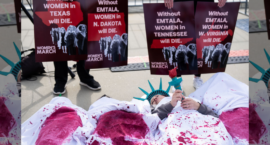
We’ve come to the point in post-Dobbs America where the legal system, and the nation’s highest Court, are now entertaining questions about how long is too long for a woman to have to wait to receive emergency care when her organs—including her reproductive organs—are in danger.
Will women again be failed by this Court? Or will the justices finally be able to look at the devastation they have caused to women and families and not blink?











